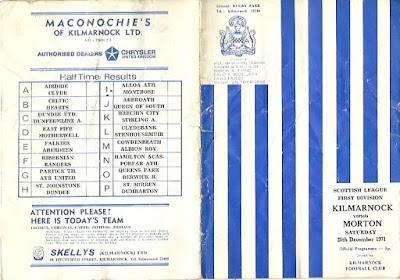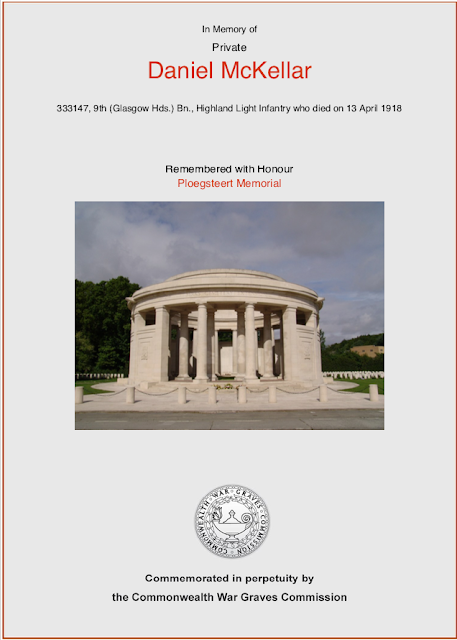They shall grow not
old, as we that are left grow old:
Age shall not weary
them, nor the years condemn.
At the going down of
the sun and in the morning
We will remember them.
(Fourth verse of ‘For
the Fallen,’ by Laurence Binyon, 1914)
Remembrance
Sunday is a time when we honour all who have given their lives in war that we
might live in peace but as we reach the centenary of the armistice that ended the First
World War, thoughts inevitably turn to those lost in that horrendous conflict.
It’s well
documented that many football players enlisted at the start of the war and many
more were called up when conscription was introduced in 1916. At this
particular time supporters throughout the land will be thinking of those lost
who had connections with their clubs. I know I am. These are the fallen of
Kilmarnock Football Club*.
ALEXANDER BARRIE 1878-1918
Born in
Camlachie in Glasgow, Alex Barrie was a well-travelled centre-half. Starting
out with Parkhead Juniors – where he was capped by Scotland at that level – he
first entered league football with St Bernard’s before moving on to Sunderland,
where he spent five seasons. One year with Rangers followed before he signed
for Killie just before his thirtieth birthday.
Although at
what was then considered the veteran stage of his career, Alex went on to give
Killie four full seasons service, turning out 121 times in the league and a
further six Scottish Cup ties. He wound down his playing days with Paisley club
Abercorn.
Alex was a
Corporal in the 2nd Battalion of the Highland Light Infantry. Aged
40 and less than six weeks before the end of the war he was killed in action.
He is buried at Flesquieres Hill British Cemetery, just outside the village of
the same name, three miles south-west of Cambrai. The inscription on his grave
reads “HE WAS A GALLANT CHIEL LOVE,
ADMIRED BY ALL”
JAMES MAXWELL 1882-1917
Born in New
Cumnock, he played for Juniors Kilmarnock Shawbank then Petershill before
signing for Killie in 1904. An excellent right-winger, his talents were
recognised by the Scottish League when he was selected to play against the
Football League in 1907. Sheffield Wednesday came in for him almost immediately
and he later signed for (Woolwich) Arsenal. He also turned out for Carlisle
United and then senior but non-league Ayrshire clubs Hurlford, Galston and
Lanemark.
He rejoined
Killie for a few months in 1912-13 before moving on to Nithsdale Wanderers.
A
Lance-Corporal in the 1st Battalion of the Seaforth Highlanders he
was killed in action on April 21st 1917, aged 35, in what was then
known as Mesopotamia, now Iraq. There is no known grave but he is commemorated
on the Basra Memorial.
He left
behind a four-year-old son, also named James. Better known by his nickname
‘Bud,’ he grew up to play as a centre-forward most notably for Killie (seventh
on the club’s all-time top scorers list, and like his father capped by the
Scottish League) and Preston North End where he won an FA Cup winners’ medal.
He served in the navy in the Second World War.
ALEXANDER McCURDIE 1895-1917
A young
centre-forward who hailed from the Ayrshire mining village (never more than 100
dwellings) of Trabboch and joined Killie at the start of the 1914-15 season. He
played eleven league games, scoring twice, and spent some time on loan at
Stevenston United.
Alex was a
Lance-Serjeant in the 14th Battalion of the Argyll & Sutherland
Highlanders when he was killed in action on April 24th 1917, aged
22. He is buried in the Fifteen Ravine British Cemetery, near the village of
Villers-Ploiuch, nine miles from Cambrai.
(Please note Mauchline is spelled incorrectly on the certificate)
DANIEL McKELLAR DOB unknown – 1918
Originally
with Bellshill Athletic, he was a winger who arrived at Rugby Park from
Ashfield at the outset of 1914-15. He missed just one league game that term,
scoring once in his 37 appearances, before enlisting at the end of the season.
He served as a Private in the 9th Battalion of the HLI (the ‘Glasgow
Highlanders’) and was killed in action in Belgium on April 13th 1918,
.
Sadly he
has no known grave. He is one of almost 11,500 commemorated on the Ploegsteert
(known to those who served as ‘Plug Street’) Memorial to the Missing near
Ypres.
‘The Last Post’ is played at the memorial at 7pm on the first
Friday of each month.
JOHN ROLLO DOB unknown – 1917
John, from
Dreghorn, signed for Killie in the spring of 1914 but never made a competitive
first team appearance. He was an Able Seaman in the Nelson Battalion of the
Royal Naval Volunteer Reserve but saw active service on land as men not needed
for naval service were rushed to the beleaguered front.
He was
killed in action on the Somme Front on February 14th 1917, aged 24
and is buried at the Varennes Military Cemetery. The inscription on his grave reads “UNTIL THE DAY DAWN SO SHALL WE EVER BE
WITH THE LORD”
DAVID SLIMMON M M 1895-1917
Kilmarnock-born
left-back who signed for Killie from Auchinleck Talbot two months before the
outbreak of war. He played sixteen league matches in 1914-15 before enlisting
in the Royal Engineers. He was a 2nd Corporal in the 419th
(West Lancs) Field Company and won the Military Medal in 1916, awarded for “acts of gallantry and devotion to duty
under fire.”
He was
killed in action, on July 23rd 1917, aged 21, and is buried in the
Hop Store Cemetery, a little over three miles from Ypres. The inscription on
his grave reads “YOUNGEST SON OF MR AND
MRS JOHN SLIMMON, ASSLOSS, KILMARNOCK, SCOTLAND”
As Richard
Cairns and Gordon Allison point out in their book “The word ‘hero’ is too often used in describing the often mundane
actions of footballers, but David Slimmon truly was one.”
CHARLES VICKERS 1891-1917
A
left-winger from Hutchesontown in Glasgow, he was a Christmas Day signing from
Kilsyth Emmett in 1913 and made his debut a month later. He played sixteen
league matches over the course of the next year, scoring once, before joining
Renton in September 1915. He enlisted as
a Gunner in the Royal Field Artillery.
He was
killed in action on June 21st 1917, aged 26, and is buried in the
Lapugnoy Military Cemetery, five miles west of Béthune in the Pas-de-Calais.
The inscription on his grave reads “SADLY
MISSED R.I.P.”
BENJAMIN THOMSON 1913-1940
It would be
remiss of me to omit Benny Thomson, the only Killie player to die in the Second
World War. Although Saltcoats-born and signed from Kilwinning Rangers, he had spent
much of his youth growing up in Canada.
A talented
right-winger he also had a penchant for scoring, notching up 39 goals in 147
league matches. In the Scottish Cup his tally for a winger was sensational,
twelve goals in thirteen outings, including eight in seven matches in 1937-38,
including the opener in the Final replay v East Fife which Killie eventually
lost 4-2 after extra time.
He joined
the Merchant Navy at the outbreak of war and was serving on the armed
merchantman S.S. Balmare, going down with the ship on November 12th
1940. He was 27 years old.
Like those
killed in the earlier conflict, Benny’s name appears on the commemorative
plaque at Rugby Park.
There is an
omission from that plaque. I don’t know why and I hope the club can rectify it.
JAMES ARMSTRONG 1887-1915
Inside-right
who played just two league games for Kilmarnock in 1912-13 but scored in both
matches. He was transferred to St Mirren in October 1913 and then to Girvan
Athletic at the start of the fateful 1914-15 season.
He enlisted
in the Cameron Highlanders and was serving in the 5th Battalion when
he was killed in action, aged 28, on October 10th 1915 at the Battle
of Loos. He is buried in the St Sever Cemetery, Rouen.
A few
additional notes:
The 1917
club AGM was a sombre affair as the deaths of both Alex McCurdie and James
Maxwell were reported to the meeting, one in France, the other in the Middle
East but each within days of the other.
Both David
Slimmon M M and James Maxwell are among the many listed on the Kilmarnock War
Memorial. Many of those there, like Maxwell, served in the Seaforths which at
first sight seems rather odd, as Ayrshire was prime recruitment territory for
the Royal Scots Fusiliers who wore the more Lowland-friendly trews as opposed
to the kilted Seaforths whose ranks were usually filled by volunteers from Ross
and Cromarty and points north.
I came upon
this while researching my first Killie book back in the 1990s and did some
digging around. I found an item in the now defunct Kilmarnock Herald of September
11th 1914 that stated "It
is a remarkable fact that the overwhelming majority of recruits in Kilmarnock
have gone to the Seaforth Highlanders. The Seaforths will largely be a
Kilmarnock Regiment".
I can only
surmise this was an early example of the “Pals” Battalions, where men from the
same area elected to join and fight together.
I can’t
close this piece without commenting that while Remembrance Sunday is a day on which
we think of those who sacrificed their lives it is also an occasion when we
should pay due respect as well to those who served and survived, those badly
wounded, those who lost limbs, those disfigured, those shattered in body and
those shattered in mind, and to those civilian men and women who also ‘did
their bit’ in the parlance of the times.
In fact the National Service of Remembrance held at the Cenotaph is "to commemorate the contribution of
British and Commonwealth military and civilian servicemen and women in the two
World Wars and later conflicts"
It is a day
when we too, the lucky ones who have never had to face what our parents, grandparents
and - for the young - generations beyond that faced, who never had to endure
what they endured, or suffer what they suffered, can ‘do our bit.’ Much was asked of them. Little is
asked of us. Just that we take two minutes out of our day to reflect, to
commemorate and to give thanks.
They shall grow not
old, as we that are left grow old:
Age shall not weary
them, nor the years condemn.
At the going down of
the sun and in the morning
We will remember them.
WE
WILL REMEMBER THEM
* Biographical details from ‘Killie
‘Til I Die’ by Richard Cairns & Gordon Allison, commemorative
certificates from the Commonwealth War Graves Commission, words by David Ross.
















